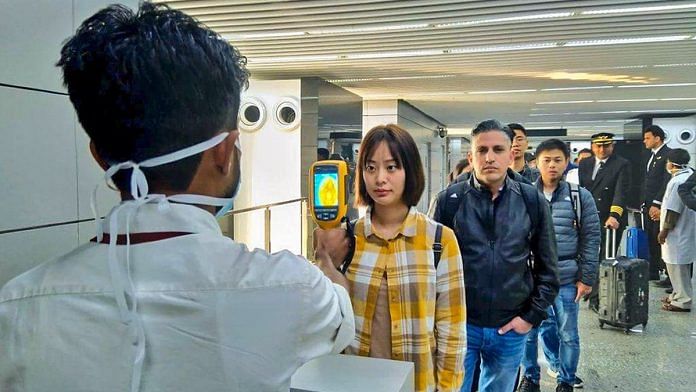The outbreak of the novel coronavirus infection emanating from the wildlife and seafood markets in China’s Wuhan city reminds me of the severe acute respiratory syndrome, or SARS, epidemic that hit the world 17 years ago. I lived in Singapore at that time, and it was a traumatic experience.
The SARS virus, like the Wuhan coronavirus, originated in China and spread around the world through air travel. The Singapore economy depends on tourism, trade and business travel, so closing the borders was not an option. When it emerged that the SARS virus transmits through humans, it looked like Singapore would be severely affected. The city-state is densely populated, most people take crowded buses and trains to work, and a lot of places — offices, shopping malls, schools, public buildings — are centrally air-conditioned. We went through weeks and months of anxiety and paranoia.
The SARS lesson
As more cases emerged, the authorities engaged in contact tracing and quarantining, temperature taking and scanning became pervasive, and N95 grade face masks became hard to find. Despite transparent and competent management by the Singapore government, fear was disproportionate to the actual numbers — out of a population of over six million, a few thousand people were home quarantined, 238 people suffered from SARS, and 33 died in the first half of 2003. So, the virus infected the bodies of a few hundred people, but affected the minds of millions.
How did Singapore contain the SARS outbreak? On the part of the authorities, it was through a systematic and methodical process of identifying potential cases (through temperature scanning), tracing their contacts, isolating those infected, and quarantining those suspected of carrying the virus. On the part of the people, it was the wearing of masks, regular taking of temperature, and maintaining personal hygiene.
It was during the SARS episode that I learned how to wash hands properly — like how surgeons do. If the virus spreads from human to human, you can prevent airborne transmission by wearing the appropriate mask; and you can prevent surface transmission by washing your hands regularly and avoiding touching your eyes, nose, and mouth. The most difficult part is to submit yourself to medical examination and potential quarantining should you develop the symptoms.
It’s not just a developed country like Singapore that can contain outbreaks. Kerala’s management of the cases of Nipah virus infection in 2018, through a combination of alert public health officials, adequate infrastructure and social capital, is admirable.
Also read: Coronavirus unlikely to turn global pandemic, say experts
A more transparent China
Unlike during the SARS epidemic, when Chinese authorities obfuscated facts and delayed global efforts to contain the outbreak, Beijing is acting with greater alacrity and responsibility this time. It appears that after a couple of weeks of dithering by local officials, President Xi Jinping decided that China’s interests are better served by being transparent and cooperating with the international community.
Chinese scientists were the first to sequence the novel coronavirus genome and publish it on an open, global platform, enabling other researchers to do more work on it. Chinese authorities are also conducting regular public briefings, apprising the world of the measures they have taken, and sharing information with the public health authorities of other countries. Xi Jinping perhaps calculates that China’s profile will rise if its scientists play a leading role in addressing the coronavirus challenge. Even otherwise, a policy of transparency will prevent China’s reputation from being sullied, as it happened during the SARS episode.
So, here is a situation where Beijing’s staunchest critics — such as this writer — hope that China’s R&D strengths come through in preventing a global epidemic. It is interesting to reflect why cooperation is the dominant response to a pandemic threat, while other trans-border threats like climate change or nuclear exchange see competition and contestation. In fact, it may turn out that in terms of injury and loss of lives, a viral epidemic is less damaging than climate change or nuclear conflict. Perhaps the immediacy, speed, lack of human agency, discrimination and cure might create a mindset that favours cooperation.
At this time, we do not know how bad the Wuhan coronavirus outbreak will turn out to be. But the manner in which the world is responding to it gives me enough hope to venture a prediction: within the next 15 years, the world will develop on-demand vaccines and treatments for a number of categories of viruses. The capability for rapid sequencing of viral genomes already exists. It will become more widespread, helping discovery and diagnostic testing. Advances in computing power and bioinformatics will make it possible to put together anti-virus molecules that can be used to make vaccines, or to treat infections. I am optimistic because this kind of capability is within reach. Of course, viruses will mutate too and the cat-and-mouse game will continue, but humanity will get an edge. And China will be a major player in this game.
The author is the director of the Takshashila Institution, an independent centre for research and education in public policy. Views are personal.




Lol
Quarantine is done when you are suspected of carrying the virus, like you are coming from Wuhan. You are isolated in a specially designated hospital when you have signs and symptoms.